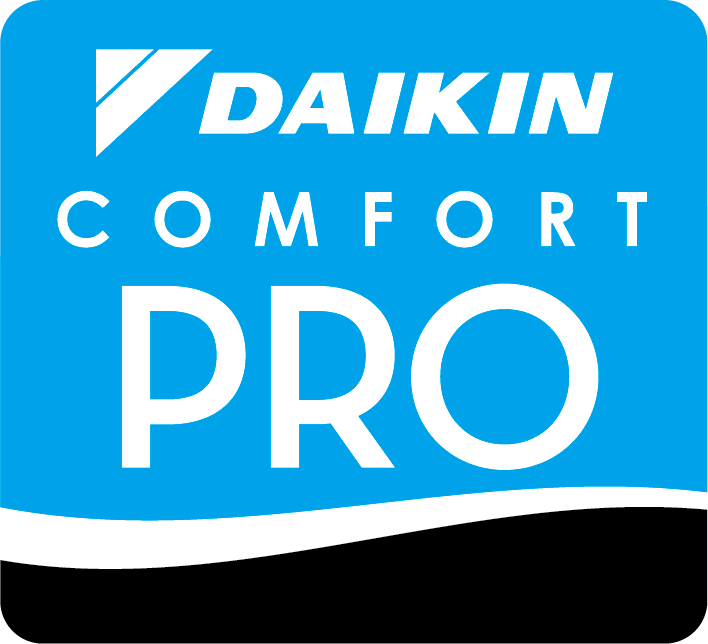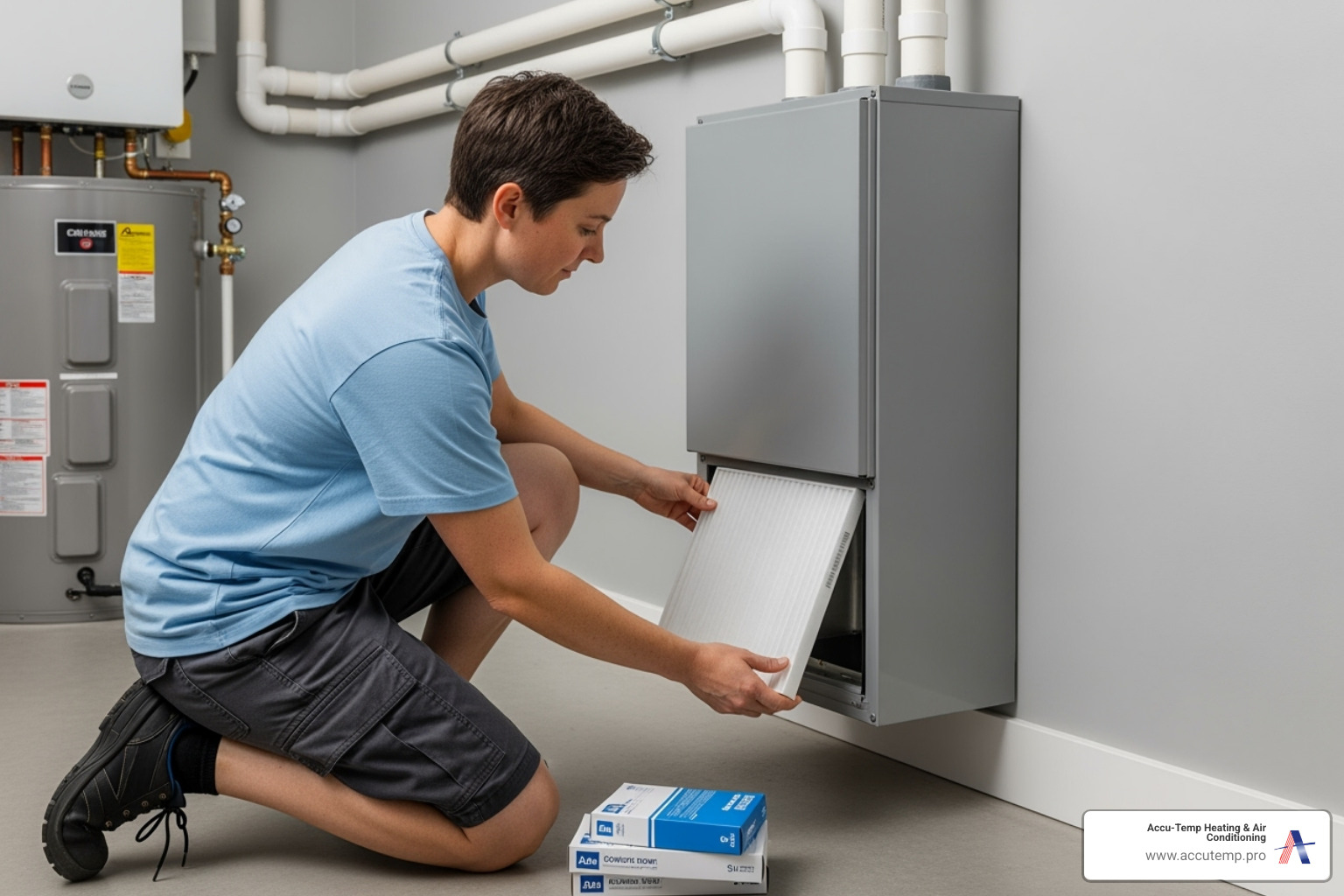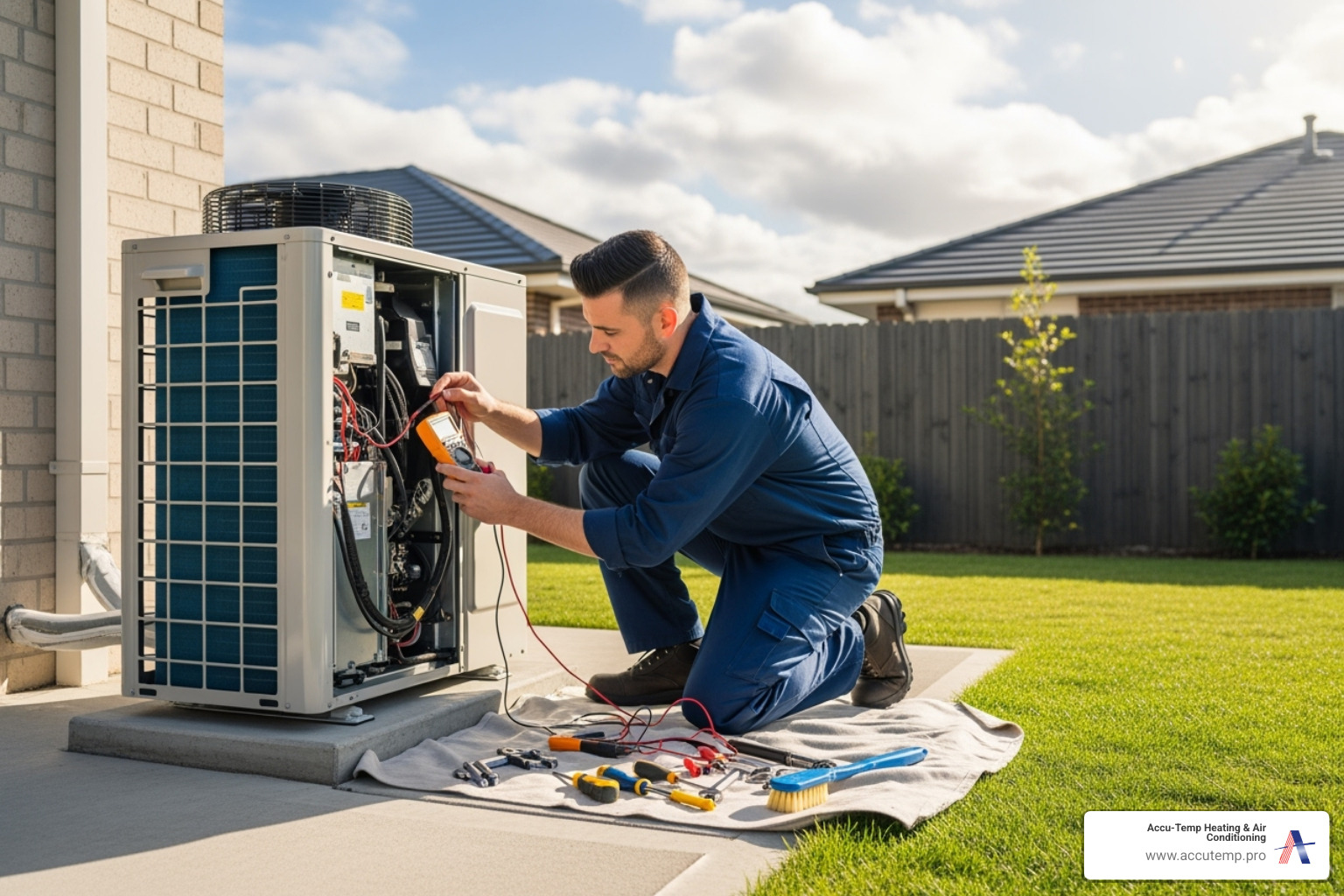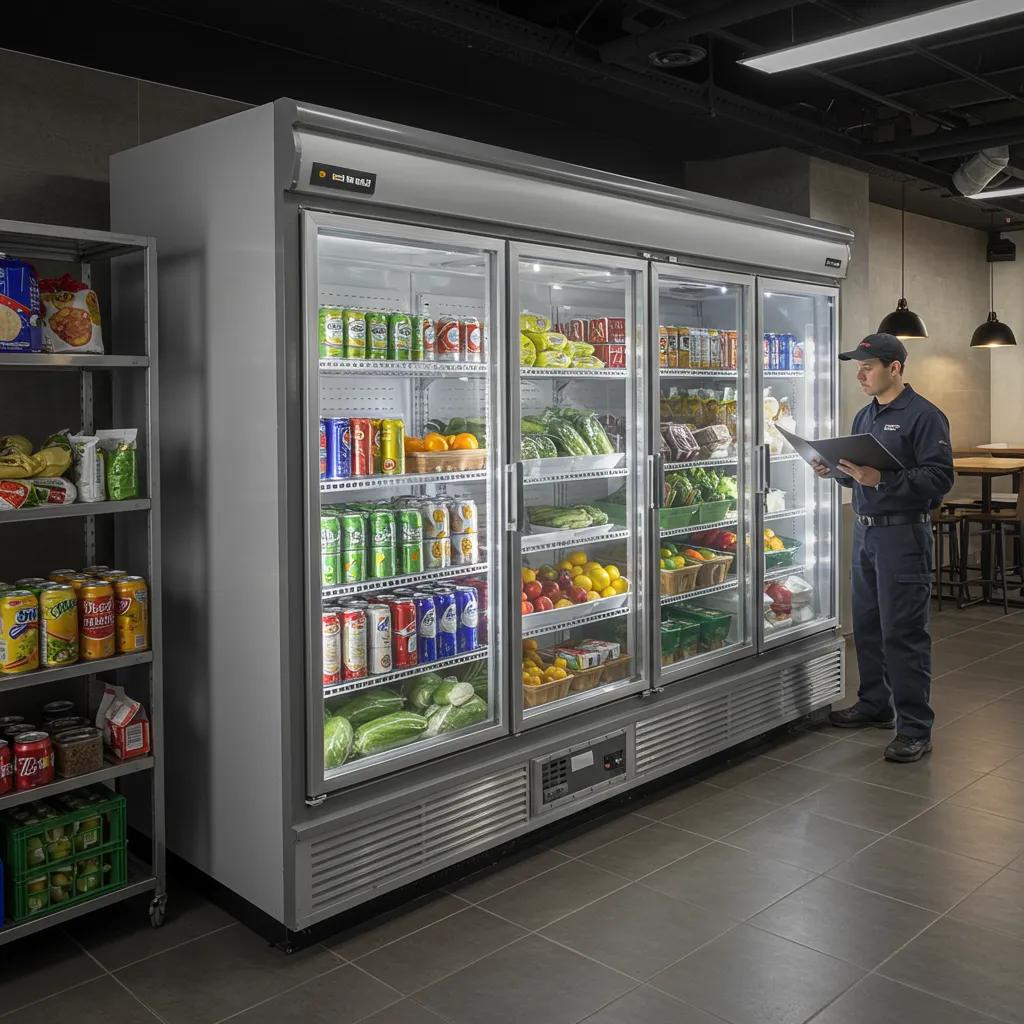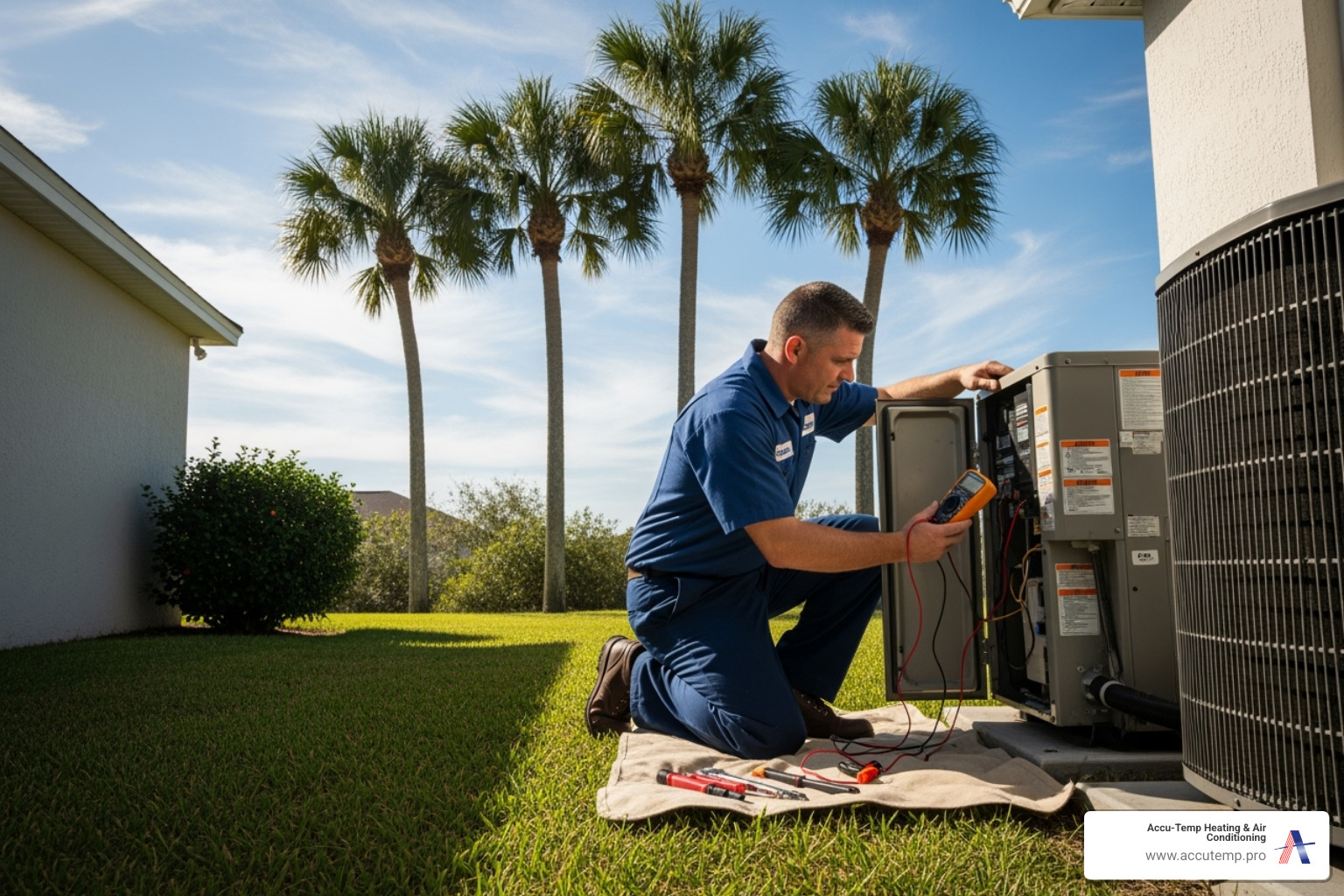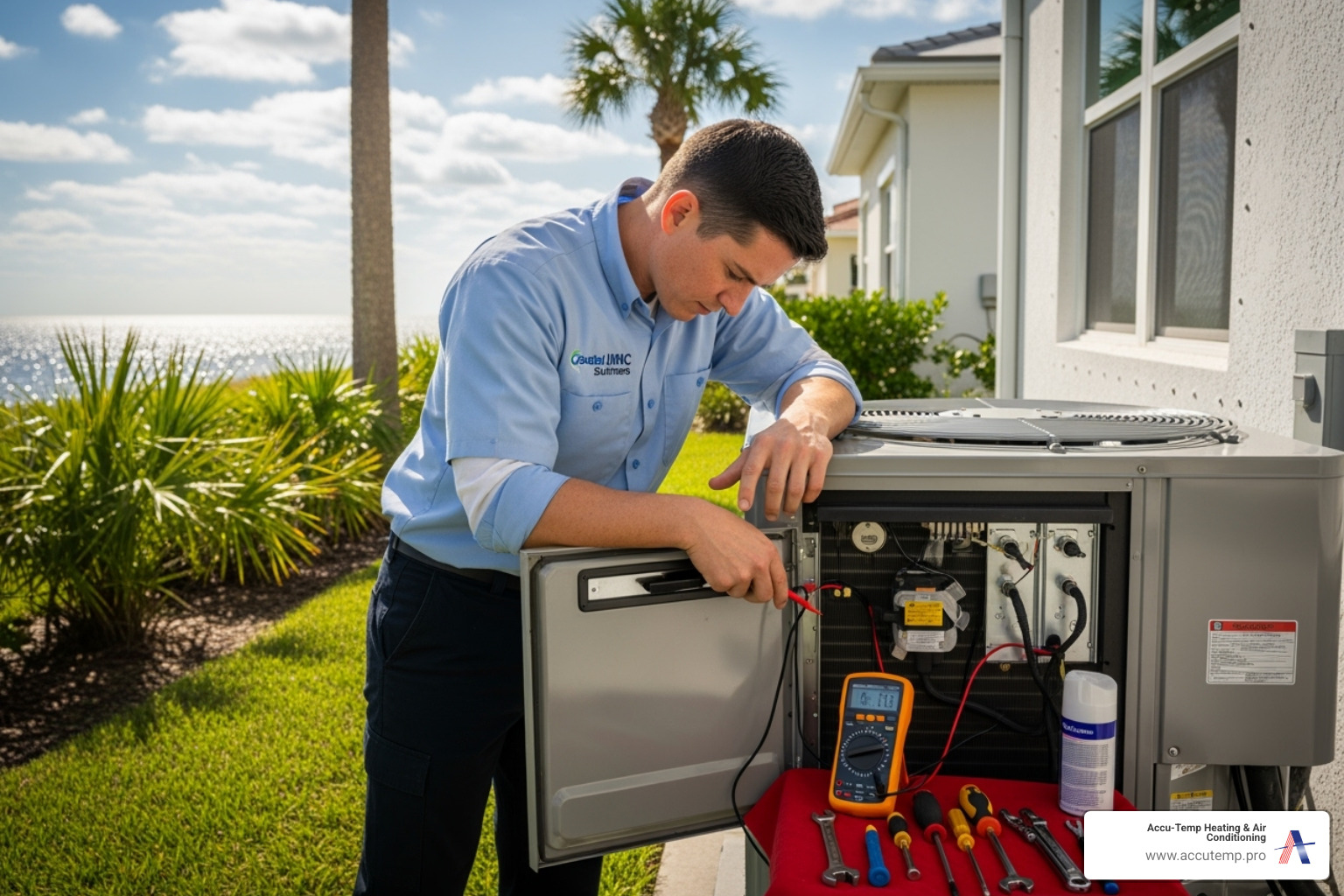Why Heat Pump Maintenance Matters
Regular heat pump maintenance is essential for keeping your home comfortable, your energy bills low, and your system running efficiently for years. Proactive care goes a long way in preventing costly issues.
Here’s a quick overview of heat pump upkeep:
- How often should air filters be cleaned or replaced? Check them monthly and clean or replace them every 1-3 months, depending on factors like pets and home activity.
- What are common DIY maintenance tasks? Homeowners can easily clean or replace air filters, keep the outdoor unit free of debris, and ensure indoor vents are clear.
- How often should professionals service your heat pump? A certified technician should perform a professional tune-up at least once a year, ideally twice (in spring and fall), for optimal performance.
A well-maintained heat pump saves you money. A neglected system can use 10% to 25% more energy, leading to higher utility bills and turning minor issues into expensive breakdowns.
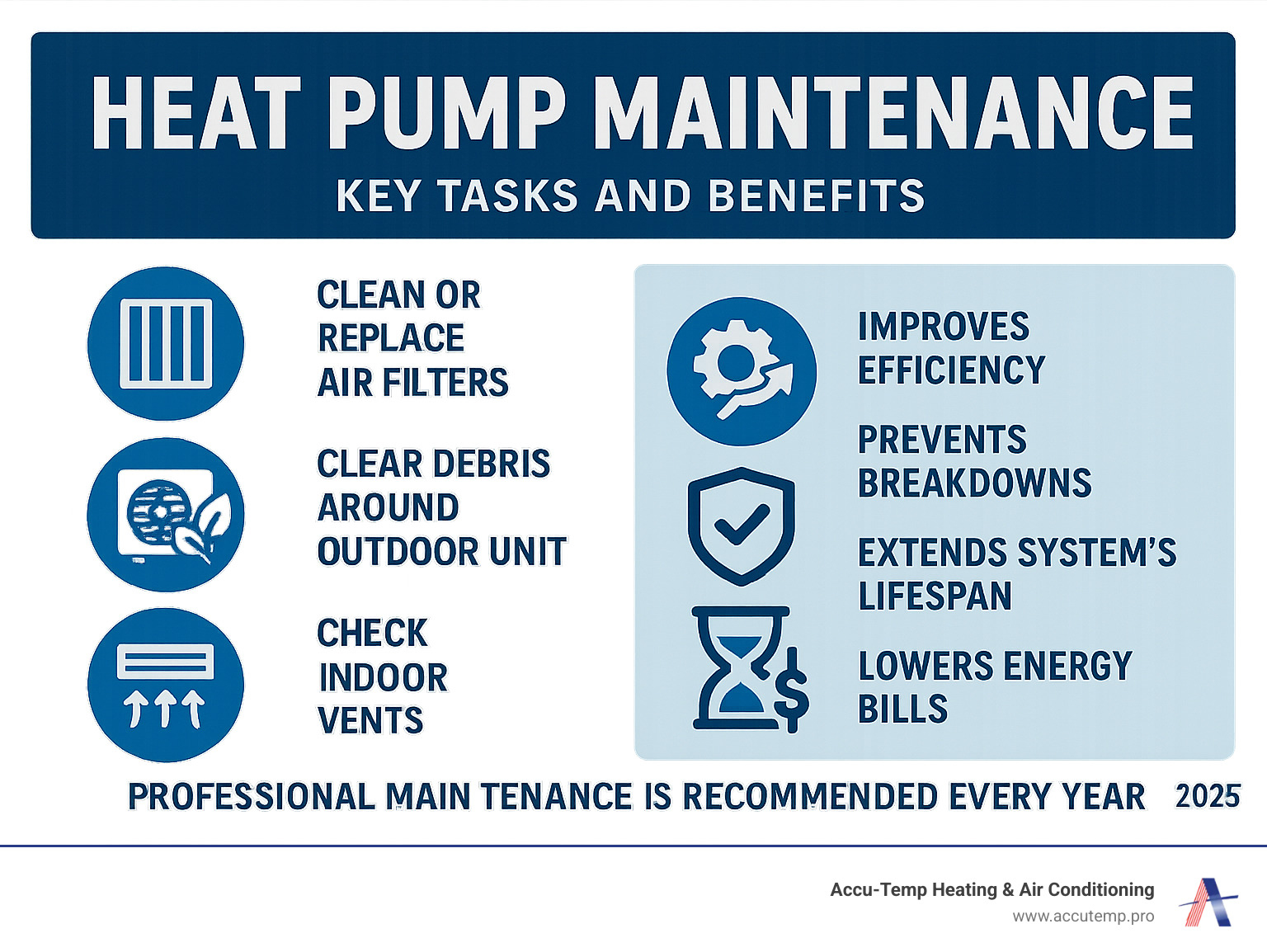
Why Regular Maintenance is a Smart Investment
Investing in heat pump maintenance is one of the smartest decisions for your home’s comfort and budget. The most immediate benefit is energy savings. A clean, well-tuned heat pump works efficiently, moving heat rather than creating it. When filters are clogged or coils are dirty, the system works harder, increasing energy use by 10-25% according to NREL. This directly translates to cost savings on monthly utility bills.
Regular maintenance also prevents expensive breakdowns by catching minor issues, like a loose wire, before they become emergency repairs. This proactive care leads to an extended lifespan, helping your system last its full 10 to 15 years or more. A well-maintained system also provides improved home comfort with consistent temperatures and better indoor air quality thanks to clean filters and coils.
Advantages of Heat Pump Systems
The Cost of Neglect
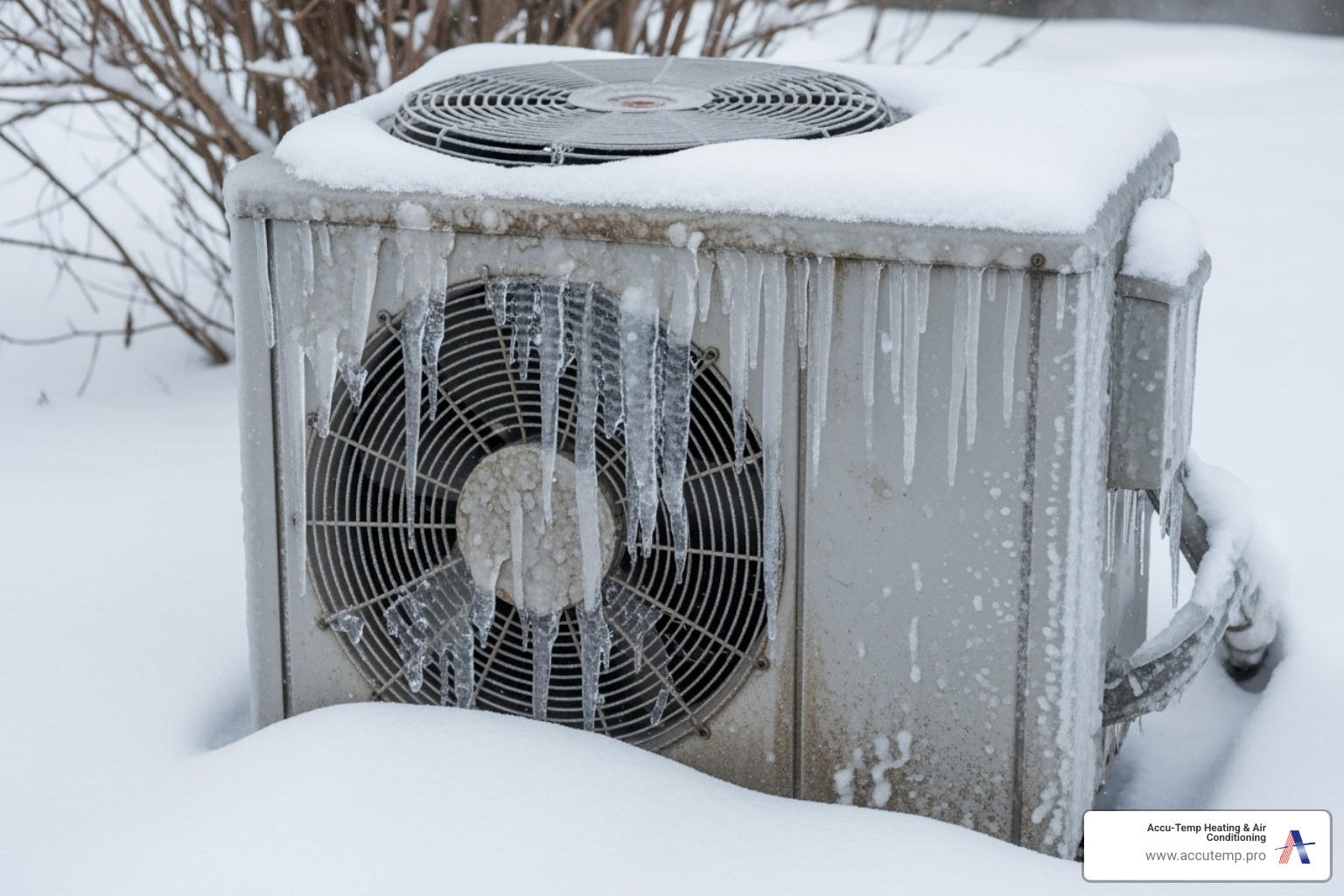
Skipping heat pump maintenance has significant consequences. The most painful are unexpected repair costs, as small problems like a dirty filter can burn out a motor or a clogged drain can cause water damage. Neglect can also lead to premature system replacement, forcing you to buy a new unit years earlier than necessary.
Furthermore, most manufacturers require proof of regular professional service to honor their warranty, so skipping maintenance can void your warranty, leaving you to pay the full cost for what should have been a covered repair. On a daily basis, you’ll experience poor performance, including weak airflow, inconsistent temperatures, and a system that runs constantly without providing adequate comfort.
Common Heat Pump Refrigerant Issues
Your DIY Heat Pump Maintenance Checklist
While professional heat pump maintenance is crucial, several simple DIY tasks can keep your system running smoothly between visits. These steps don’t require specialized tools and can significantly impact your heat pump’s efficiency and longevity.
These tasks fall into a few categories:
- Monthly Checks: Perform quick checks every month, especially during peak seasons.
- Seasonal Checks: Do more thorough checks in the spring and fall.
- Basic Tools: You’ll only need a screwdriver, soft brush, garden hose, and cloths. Always turn off the power at the breaker before performing any maintenance!
Essential Filter Care
Filter care is the most impactful DIY heat pump maintenance task. A dirty filter restricts airflow, forcing the system to work harder, which increases energy bills and wear. For standard 1-inch filters, check them monthly and replace every 1-3 months. Change them more frequently if you have pets, allergies, or smokers in the home. Thicker media filters (4-5 inches) may last up to a year.
When replacing, ensure the airflow arrow on the filter’s frame points toward the unit. Use a filter with a MERV rating appropriate for your system; a rating that’s too high can restrict airflow if the system isn’t designed for it.
HVAC Maintenance Improve Indoor Air Quality
Keeping the Outdoor Unit Clear
Your outdoor condenser unit needs to be clear of debris to exchange heat effectively. Leaves, grass clippings, and dirt can block the coils and restrict airflow, reducing efficiency.
Here’s how to keep it clean:
- Clear the Area: Maintain at least 18-24 inches of clearance on all sides. Trim back any encroaching bushes, shrubs, or grass.
- Remove Debris: Use a soft brush or your hands to remove leaves and dirt from the top and sides of the unit.
- Clean the Coils: Turn off the power at the breaker first. Gently rinse the outer coils with a garden hose. Do not use a high-pressure washer, as it can bend the delicate fins. Use a fin comb to straighten any bent fins.
- Check for Leveling and Drainage: Ensure the unit is level and liftd 4-8 inches off the ground for proper drainage. Make sure gutters are not dripping directly onto the unit.
- Winter Considerations: In cold weather, gently brush away any significant snow or ice buildup to assist the defrost cycle.
How to Use and Take Care of a Heat Pump the Right Way
Indoor Component and Airflow Checks
A few indoor checks are also vital for effective DIY heat pump maintenance.
- Cleaning Vents and Registers: Regularly vacuum dust and debris from indoor supply and return vents. Ensure they are not blocked by furniture, rugs, or curtains.
- Checking the Condensate Drain: During cooling season, moisture drains away through a condensate line. If this line clogs with algae or debris, water can back up and cause damage. You can help prevent clogs by carefully pouring a cup of distilled vinegar down the drain line’s access point. If a clog persists, call a professional.
- Ensuring Clear Return Air Paths: Your system needs to pull in air to function. Make sure large return air grilles are not blocked. Keeping interior doors open helps with air circulation, preventing pressure imbalances that reduce efficiency.
Why Your Heat Pump Isn’t Dehumidifying
When to Call the Pros: A Guide to Professional Heat Pump Maintenance
While DIY tasks are beneficial, professional heat pump maintenance is essential for safety and system health. Your heat pump contains high-voltage electrical components and pressurized refrigerant that require certified technicians with specialized tools to service safely.
Attempting complex repairs can lead to electrical hazards or injury from refrigerant handling. Professionals use tools like manifold gauges, leak detectors, and digital multimeters that are necessary for accurate diagnosis.
Call a pro if you notice these 5 key warning signs:
- Strange noises (grinding, squealing)
- Short cycling (turning on and off frequently)
- Spiking energy bills
- Weak airflow
- Visible leaks or moisture
Signs Your Heat Pump Needs Professional Service
Your heat pump will often signal when it needs attention. Be aware of these common signs:
- Strange noises: Your system should run quietly. Grinding or squealing sounds often indicate motor bearing problems that need immediate attention to avoid a full motor replacement. Hissing can indicate a refrigerant leak.
- Short cycling: If your heat pump turns on and off in rapid succession, it’s putting immense strain on the compressor and wasting energy. This requires professional diagnosis.
- Spiking energy bills: A sudden increase in your bills without a change in usage suggests your heat pump is working inefficiently due to an underlying issue.
- Weak airflow: If air isn’t flowing strongly from your vents, it could be a dirty filter, but it might also signal a problem with the blower motor or ductwork.
- Leaks or moisture: Water pooling near the indoor unit indicates a clogged condensate drain. Ice buildup on either unit often points to a serious refrigerant issue that can destroy your compressor.
Expert Tips for Troubleshooting Heat Pump Issues
Heat Pump Short Cycling: Top Causes
What’s Included in a Professional Heat Pump Maintenance Visit?
A professional heat pump maintenance visit is a comprehensive system health check. A certified technician will:
- Inspect and tighten all electrical connections for safety and reliability.
- Check refrigerant levels to ensure they are precise for optimal performance and find/fix any leaks.
- Perform motor lubrication to prevent premature wear on moving parts.
- Conduct a blower component cleaning to improve airflow and reduce strain on the motor.
- Deep-clean both indoor and outdoor coils for proper heat transfer.
- Calibrate the thermostat for accurate temperature control.
- Inspect the condensate drain to prevent clogs and water damage.
- Perform a basic ductwork inspection for obvious leaks.
The visit concludes with a full system test to ensure all components work together correctly.
Recommended Frequency for Professional Heat Pump Maintenance
For most Florida homeowners, we recommend professional service twice a year: once in the spring to prepare for cooling season, and once in the fall for heating season. An annual service is the absolute minimum. This twice-yearly schedule provides the best protection for a system that runs year-round.
Regular maintenance is also often a warranty requirement from the manufacturer. Skipping service can void your coverage. The cost of these seasonal tune-ups is minimal compared to emergency repairs, and the 10-25% energy savings can help the service pay for itself.
To find qualified professionals, you can use resources like the Department of Energy’s list of certified technicians.
Find a certified technician through DOE recognized programs
Frequently Asked Questions about Heat Pump Care
Here are answers to some of the most common questions we receive about heat pump care in the Palm Coast and Daytona Beach area.
How often should I change my heat pump’s air filter?
For standard 1-inch disposable filters, the general rule is to check monthly and replace every 1 to 3 months. You should change it more often if you have pets, smokers, or allergy sufferers in the home, or during periods of high dust like construction. Thicker media filters (4-5 inches) can last longer, often 6 to 12 months. When in doubt, a visibly dirty filter should always be replaced.
What are the main consequences of skipping maintenance?
Skipping heat pump maintenance can lead to several negative outcomes. You can expect higher energy bills, as the system works harder and less efficiently (using 10-25% more energy). Your home will have reduced comfort and poor indoor air quality. Most significantly, you risk more frequent and costly repairs, a shortened system lifespan, and potentially voiding your manufacturer’s warranty, which often requires proof of regular professional service.
Is it safe to clean the outdoor unit myself?
Yes, performing basic cleaning on your outdoor heat pump unit is safe if you follow one critical rule: Always turn off the power to the unit at both the outdoor disconnect switch and your home’s main circuit breaker. Once the power is off, you can clear away leaves and debris from the unit’s exterior. Gently rinse the fins with a garden hose—never a pressure washer, which can cause damage. You should not attempt to open the unit’s internal panels or handle any electrical or refrigerant components; leave those tasks to a certified professional.
Keep Your System in Peak Condition
Your heat pump is a vital investment in your home’s year-round comfort. Proactive heat pump maintenance is the key to ensuring it operates at peak performance, keeping energy bills low and preventing unexpected breakdowns. This involves a partnership: you handle the simple DIY tasks, and we handle the technical details.
Your role includes monthly filter changes, keeping the outdoor unit clear of debris, and ensuring indoor vents are unobstructed. These steps significantly impact your system’s efficiency.
For more complex tasks involving electrical connections, refrigerant levels, and mechanical components, professional service is essential. Recognizing warning signs like strange noises or spiking energy bills and calling for help early can save you from costly repairs.
For our neighbors from Palm Coast to Daytona Beach, Accu-Temp Heating & Air Conditioning is your trusted partner for heat pump health. Our certified technicians provide comprehensive maintenance to ensure your system runs flawlessly through every season. As a family-owned business, we treat our customers like family, providing peace of mind with our 100% satisfaction guarantee.
Don’t wait for a problem. Proactive care is the key to year-round comfort and savings.

